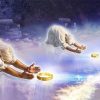MP3: The Mighty Angels of Daniel 8
Hosts: Nathan Jones & Vic Batista
The Raging Goat
Vic Batista: The Vision of a Ram and a Goat found in Daniel 8 makes much more sense after reading similar visions found in Daniel 2 and 7.
Nathan Jones: True, let’s look at Daniel 2. King Nebuchadnezzar was given a dream about a giant statue. It had a head of gold, the chest and arms were comprised of silver, the waist was bronze, the legs were made of iron, and the feet consisted of a mixture of iron and clay. God provided the interpretation of the dream statue to Daniel, and then Daniel gave it to Nebuchadnezzar. This, by the way, is the first vision Daniel gets to interpret for the king.
The interpretation of the statue is that Babylon’s Nebuchadnezzar is that head of gold. That head of gold would be replaced by the silver empire of the Medes and Persians. Those nations were well known for their wide use of silver. The Greek Empire was represented by bronze, and Alexander the Great would conquer the Medo-Persian Empire. Finally, the empire made out of iron would conquer and destroy the Greek Empire. History shows that the Roman Empire was that fourth empire which trampled the nations under its iron boots, but eventually became frail and fell apart, represented by the feet made of a mixture of iron and clay.
Nebuchadnezzar’s statue would be destroyed by a mountain-sized rock not cut by human hands. The rock is thrown down from out of the heavens and shatters the statue, leaving its dust to blow away in the wind.
The interpretation Daniel is given in chapter 2 covers the major empires that would affect Israel over the course of human history up to the point when Jesus returns. When Jesus does return, He will destroy human government and set up His own kingdom here on earth.
Vic Batista: Jump to Daniel 7 and we again encounter yet another vision concerning the rise and fall of these empires.
Nathan Jones: Correct, in Daniel 7, he is given another dream, but this time the vision portrays Babylon as a winged lion, the Medo-Persian Empire as a bear, the Greek Empire as a winged leopard, and then a hideous beast which was the Roman Empire.
Daniel 8 is the third time that Daniel’s visions reveal how human governments will rise and fall and empires would come and go. That empires do not last should be a good reminder for us today. Some think that we live in an empire — the American Empire — and that it will last forever. But, empires come and go throughout history, and even the most powerful ones cannot always stand up to the forces of change. Daniel’s prophecies foretell that eventually all human government will be destroyed by the return of Jesus Christ.
Vic Batista: What’s so excellent about fulfilled Bible prophecy is that anyone can open a regular history books in school regarding these empires and see that Daniel’s prophecies all came true. Fulfilled Bible prophecy is a fantastic proof for the divine origin of the Bible.
Fulfilled #BibleProphecy is a fantastic proof for the divine origin of the #Bible. Click To TweetNathan Jones: You’ve got that right! Daniel’s prophecies have been so accurate that many of the detractors of the book Daniel claim that he must have prophesied them hundreds of years after the fact. They then redefine the time of authorship, for Daniel’s Sixth Century BC origins must be all wrong. Instead of being written in the 500s BC, these liberal theologians move the date up to around 200 BC so that Daniel’s prophecies become historical account rather than prophetic foretelling.
Daniel, especially in chapter 11, provides a play-by-play of what will happen throughout the few hundred years leading up to Jesus Christ. Daniel was there to witness the Medo-Persian Empire rising and conquering Babylon, and it did, but Daniel was not alive to see the Greek Empire rise. Daniel was not there to witness Philip the Second of Macedonia unite all the Greek city states, except for Sparta.
Philip’s son, Alexander, went on to be considered the greatest of all the Greek kings because he was a super warrior. He conquered everything in his path! Daniel’s vision tells of a goat that doesn’t even touch the ground because it is moving so fast. And that’s how Alexander the Great conquered — in 334 BC he blitzkrieg across the Middle East and conquered everyone he encountered.
Alexander had long been ticked off at the Medo-Persian Empire for defeating his people back at the Battle of Marathon in 490 BC, and then again at the Battle of Salamis in 481 BC. Alexander wanted payback! And that’s just what he did; he destroyed the Medo-Persian Empire. In Daniel’s vision, the goat was furious at the ram and so smashed it and destroyed it. Daniel 8:7 describes the scene:
“And I saw him confronting the ram; he was moved with rage against him, attacked the ram, and broke his two horns. There was no power in the ram to withstand him, but he cast him down to the ground and trampled him; and there was no one that could deliver the ram from his hand.”
And that is what Alexander the Great did. He was so furious and hated the Medo-Persian Empire so much that he used all of his full forces to smash, annihilate, and destroy his hated enemy.
Vic Batista: As we look at using Scripture to interpret Scripture, we see Daniel 7 describe this very same scenario of empire destroying. First is the fall of Babylon in verse 4, which says: “The first was like a lion, and had eagle’s wings. I watched till its wings were plucked off; and it was lifted up from the earth and made to stand on two feet like a man, and a man’s heart was given to it.”
Then, in Daniel 7:5, “And suddenly another beast, a second, like a bear. It was raised up on one side, and had three ribs in its mouth between its teeth. And they said thus to it: ‘‘’Arise, devour much flesh!'” This is the Medo-Persian Empire.
In verse 6 the Greek Empire arrives, “After this I looked, and there was another, like a leopard, which had on its back four wings of a bird. The beast also had four heads, and dominion was given to it.”
So, Daniel 2, 7 and 8 are all describing the same empires and their demise.
Nathan Jones: The Greek Empire under Alexander the Great grew quick as a sprinting leopard. Unfortunately, Alexander died young in 23 BC. He was only 32 years old. Besides having gotten as far as India where something about the Indian elephants didn’t settle well with him, he decided he’d conquered enough of the world, so who cares about India, and so he turned around. When Alexander returned to Babylon, he came down with malaria. Here’s Alexander the Great, one of the greatest warriors in all of human history, and he dies from a bug bite!
#AlexandertheGreat, one of the greatest warriors in history, dies from a bug bite! #BookofDaniel Click To TweetHistory attests to the fact that after Alexander died young of malaria, he left no viable heirs. So, what ended up happening is that his kingdom was split up among his four generals. That’s what we read about in Daniel 8:8. “Therefore the male goat grew very great; but when he became strong, the large horn was broken, and in place of it four notable ones came up toward the four winds of heaven.”
The kingdom of Greece was divided into four regions. It was still Greece, but divided. Ptolemy, who was one of Alexander’s generals, claimed Egypt and parts of Asia Minor. Cassander was given the territory of Macedonia and Greece. Lysimachus was given Thrace and parts of Asia Minor. Selecus was given the remainder of Alexander’s empire in Syria, which incorporated Israel and Mesopotamia. Later in Daniel 11, where we read the prophetic future of the Ptolemies in Egypt and the Seleucids in Syria fighting back and forth with each other, there’s a trampling of Israel every time the armies are marched across the Holy Land. Israel was stuck as a buffer between the two generals and their descendants.
In the tenth segment of this series on the mighty angels of Daniel, we’ll apply the tragedy that is Alexander the Great to our lives today.







I disagree with Vic on this…
“So, Daniel 2, 7 and 8 are all describing the same empires and their demise.”
The empires Daniel mentions in ch. 7 are all end-time empires. Daniel 8 describes “the inferior kingdom” of Daniel 2.